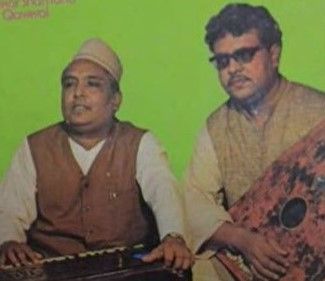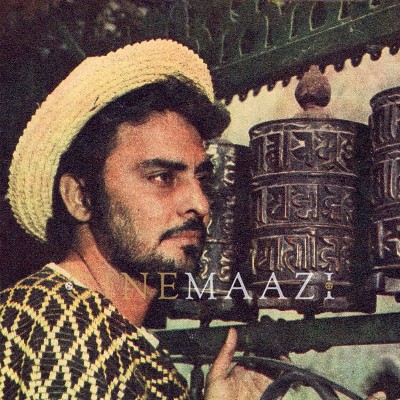Shankar-Shambhu

Subscribe to read full article
This section is for paid subscribers only. Our subscription is only $37/- for one full year.
You get unlimited access to all paid section and features on the website with this subscription.
Not ready for a full subscription?
You can access this article for $2 , and have it saved to your account for one year.
- Died: Shankar-10/3/1984; Shambhu-5/2/1989
- Primary Cinema: Hindi
- Children: Shambhu's children: Rakesh Pandit, Deepak Pandit; Shankar’s child: Ram Shankar
The famous Sufi singers and Qawwal duo, brothers Shankar-Shambhu had the distinction of being the only Hindu qawwals in the subcontinent. They performed across dargahs, temples, and gurudwaras, thrilling listeners and moving hearts. Their contribution becomes especially relevant in the times of polarisation, serving as a reminder of our valuable, syncretic culture that needs preserving at all costs. Witnessing them bringing listeners to tears with their rendition at the Urs Sharief at Ajmer, filmmaker Mehboob Khan invited them to Bombay, to sing at the inaugural ceremony of his Mehboob studio. Soon they established themselves in the Hindi film industry as playback singers and music directors rendering songs such as Kissa hota hai shuru from Teesri Kasam (1966) and Ho ke maayus tere from Laila Majnu (1976). They also composed music for Tumhara Kalloo (1975) and Kaala Sooraj (1986).
Born and brought up in the village of Chandausi, Dariyapur, Aligarh district, UP, Shankar and Shambhu grew up in an atmosphere imbued with music. They were 7 and 5 years of age respectively, when they started learning music under the guidance of their father, Chunnilal Ustad. A well-known folk and classical singer, Chunnilal Ustad also ran a nautanki (theatre) group across UP. The brothers went on to be further trained in Indian classical music from Guru Shri Mohanlal Ji of Jaipur Gharana. Ustad Chand Khan Sahib of the Delhi Gharana also provided additional vocal guidance. Their training continued with lessons in Urdu, Arabic and Persian from the poets, Janab Shariq Irayani and Janab Qamar Sulemani. Soon, they started performing live in public, singing Ghazal, Qawwali and Sufiana Kalaams.
Their fame as artistes grew further when they were advised by Gaddi Nasheen of the Hazrat Sufi Sahab Dargah Sharif in Kanpur, to perform at the Urs Sharif of Hazrat Khwaja Garib Nawaz of Ajmer Sharif. However, owing to a long line of performers waiting to perform at the hallowed venue, the newcomer duo did not get the chance to sing in the Mehfil Khana. Shankar took the decision to fast for three full days sans even water in front of the Dargah Sharif. When the management of the shrine learnt of this on the fourth day, they granted the duo permission to perform in the Mehfil Khana on the last day of the Urs Sharif. Shankar-Shambhu’s rendition of Mehboobe kibriya se mera salaam kehna is said to have left listeners enthralled, with not a single dry eye in the gathering. That day forward, they were honoured with the title of ‘Qawwal’, becoming famous as Shankar-Shambhu Qawwal.
The journey didn’t end there. Among the faithful who had witnessed their stirring performance at the Ajmer Sharif was legendary filmmaker Mehboob Khan. He later met them and invited them to Bombay to perform at the inauguration of his soon-to-be-launched Mehboob Studios in Bandra. Thus, did Shankar-Shambhu arrive in the city, to find the industry welcoming them warmly. Their fame in the city grew as Sufi singers, even as they went on to render playback and also compose music for films. They are credited as the music directors of Tumhara Kalloo (1975), Aaj Ki Pukar (1976), Dil Ek Khilona (1978), Hind Ki Wali (1978), and Bindiya (1978). They also rendered playback in Badal Aur Bijli (1956), Tumhara Kalloo, Barsaat Ki Raat (1960), and Laila Majnu (1976), besides also appearing onscreen in the film Tumhara Kalloo.
Besides rendering Sufiana Kalaam, Shankar-Shambhu were also adept at singing other genres such as Bhajan, Mata Ki Bhentein, Gurbani, and Sai Bhajan, singing with fluency in 8 different languages. Performing across India as well as abroad, they won appreciation and applause from admirers across castes and religions. Their mastery of the art of Qawwali, usually the domain of Muslim singers, amazed their audiences. They garnered praise from great Indian personalities like Dr Zakir Hussain and Atal Bihari Vajpayee, and were also felicitated with honorifics such as Khwaja Pasand, Fanafil Moin, Qaumi Ekta Ke Pratik, and Shahenshah-E-Qawwal.
Their success story however was cut short when older brother Shankar passed away in an accident on 10 March, 1984. Five years later, younger brother Shambhu passed away on 5 February, 1989 following a heart attack in Delhi. The musical tradition continues, as Shambhu’s son Rakesh Pandit is a playback singer and his other son Deepak Pandit is a noted composer-violinist in Hindi films. Together, Shankar’s son Ram Shankar, and Shambhu’s son Rakesh walked in the footsteps of their respective fathers, carrying on the Shankar-Shambhu legacy. Shankar-Shambhu remains a symbol of Indian unity in diversity, a mark of the country’s rich, pluralistic cultural traditions.
References
Image credit: https://www.youtube.com/watch?v=C98tPbrt-90
-
Filmography (1)
SortRole
-
Tumhaaraa Kalloo 1975
-










.jpg)



